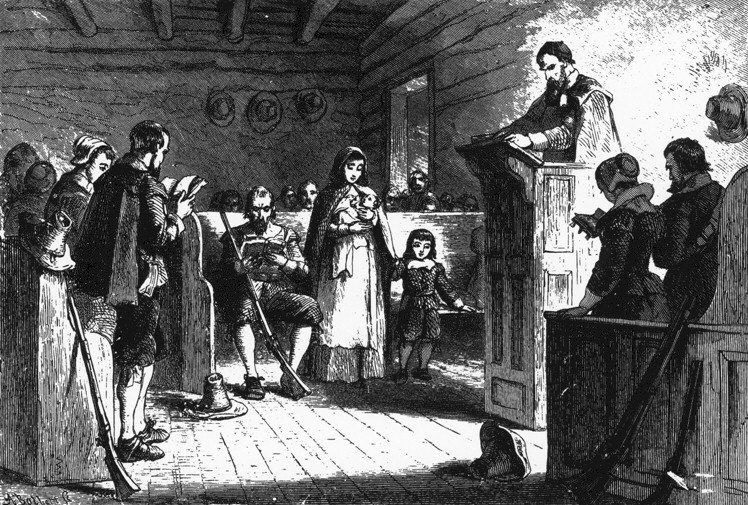Emphases in Preaching – Charles W. Koller

Preaching emphases may shift, but only within limits which are unalterably fixed:
- That which the minister proclaims must be truly the Word of God. The minister stands in direct succession with the apostles and prophets who declared, “Thus saith the Lord.” The minister’s message is not his own; he is an “ambassador for Christ” (2 Cor. 5:20). The true ambassador does not presume to originate a message of his own; he conveys the message entrusted to him by his sovereign.
The world is not greatly interested in the opinions and speculations of the preacher; but the world listens when he declares, humbly, intelligently, with spiritual concern and spiritual attractiveness, “Thus saith the Lord!” The word of man does not become the Word of God by being loudly proclaimed, and no amount of noise and lather can substitute for the note of authority. God does not promise to bless the proclamation of our own clever ideas; but he does promise “… my word … shall not return unto me void …” (Isa. 55:11).
- The message must be complete. A half truth might be as hurtful as an untruth. To neglect either half of the Great Commission may be as dangerous as outright heresy. The responsibility of the minister is to “make disciples” and to “teach them.” His calling is thus a calling with a twofold thrust—salvation and nurture, salvation and the “things that accompany salvation” (Heb. 6:9).
After salvation there is need for indoctrination (Eph. 4:14), consecration (Rom. 12:1), inspiration (Neh. 8:10), comfort (1 Thess. 4:18; Isa. 40:1), strengthening (Col. 1:11), conviction (Acts 4:20), and action (James 1:22).
But the primary concern is to “make disciples.” A “disciple” is a willing learner, with his heart open to the truth of the gospel, responsive to it, and ready to be led further. We are not merely to inform our hearers, or to provoke thought, but like the Gospel of John, to induce belief; not merely to improve their manners, or to make them more comfortable on the way to destruction, but to save them from destruction. Only when they have become “disciples,” are they ready to be taught “all things whatsoever.…”
- The message must be rightly motivated. The greater part of the human family is out of fellowship with God—alienated, unreconciled and suffering all the consequences. The minister is therefore essentially a minister of reconciliation, and the test of his labors is, What happens to the man in the pew? The supreme tribute is that which was accorded to John the Baptist: When his disciples “heard him speak … they followed Jesus” (John 1:37). Nowhere is the Scriptural conception of the minister’s task more perfectly expressed than in the familiar words of the Apostle Paul: “We are ambassadors for Christ, as though God did beseech you by us; we pray you in Christ’s stead, be ye reconciled to God” (2 Cor. 5:20). The preacher whose ministry is steeped in the spirit of this text can not possibly go far wrong in doctrine, spirit, procedure, or emphasis.
The apostles have set an excellent example, and there is much to learn also from those who have ministered before us on the American scene.
-
THE EMPHASIS OF THE APOSTLES
The ministry of Peter and those associated with him is presented with amazing completeness in the second chapter of the Book of Acts. Here is evangelism at its best, and the spiritual nurture that should follow. Here, with vivid recollections of his Lord, and mindful of the twofold thrust of the Great Commission, Peter presents the Christ of the Gospels—His Messianic identity, His sinless life, His atoning death, His bodily resurrection, and His eternal sovereignty. The sermon is strongly doctrinal, containing the greatest body of truth ever put together in one sermon. So frequently do these doctrinal points recur in the messages of the apostles in the New Testament that they came to be known as “The Apostolic Formula.”
Here the minister sees what to preach, what kind of an “invitation” to give, and what to do after baptism. Here also is the complete program of Christian nurture—the “all things whatsoever” of Christ’s Great Commission. The believers “continued steadfastly in the apostles’ doctrine and fellowship, and in breaking of bread, and in prayers” (Acts 2:42), and in witnessing, worshiping, and giving. This Spirit-filled church, with its fully rounded program, has never been equaled in spiritual attractiveness and spiritual effectiveness. It was a happy church—“with gladness … praising God”; it was a popular church—“having favor with all the people”; and a fruitful church—“The Lord added to the church daily …” (Acts 2:42–47).
The ministry of Paul, like the ministry of Peter, is notable for the inclusiveness of its emphases. In Acts 20, a number of arresting phrases account for his phenomenally fruitful ministry of three years in Ephesus:
- “All seasons” (v. 18). His spiritual concern was not seasonal, but perennial; not occasional, but unceasing. The fruitage of such a ministry is not seasonal, but continuous, like that of the orange tree in continuous production bearing buds, blossoms, tiny oranges, half grown and full grown oranges, and fully ripe oranges simultaneously.
- “All the counsel of God” (v. 27). This means a balanced spiritual diet, emphasizing both the theological and the ethical, the doctrinal and the practical. An unbalanced diet produces unsymmetrical saints; obsessions produce cranks, controversies and schisms; omissions leave the soul unfortified against sin and error. In touching every area of human experience, Paul labored for “the perfecting of the saints” (Eph. 4:12), and the fulfillment of both “the first and great commandment” (“Thou shalt love the Lord thy God”) and “the second … like unto it” (“Thou shalt love thy neighbour as thyself”) (Matt. 22:37–39). To observe the Golden Rule is not enough; there must be “glory to God,” as well as peace among men (Luke 2:14).
- “Publicly and from house to house” (v. 20). Either without the other is incomplete. There is no substitute for preaching; nevertheless, there are more lost souls in “the highways and hedges” (Luke 14:23) than in our houses of worship.
- “Jews and … Greeks” (v. 21). Paul’s ministry reached across racial barriers and smoldering resentments. He has a gospel for “both sides of the tracks,” for the high and the low, “the wise and the unwise.” Like the Lord Jesus, who was compassionate toward the cultured Pharisee Nicodemus and the fallen woman of Samaria, Paul witnessed with equal concern to King Agrippa and the slave Onesimus.
- THE EMPHASIS OF AMERICAN PREACHERS
Voluntariness in religion has made American Christianity the most diverse in the world. There is more religious activity and probably less bitterness of religious feeling than in any other country. With liberty of soul and freedom of speech the preacher addresses himself to the needs of his people as he conceives them to be. Changing times and circumstances bring changing emphases. Wars, depressions, disasters, political upheavals, theological controversies, and spiritual decadence call for light and guidance from the Word of God.
Perhaps the minister reacts to some prevailing error or the neglect of some vital doctrine. His preaching then reflects the age in which he is living. But, as Ernest Trice Thompson points out in Changing Emphases in American Preaching (Westminster Press), the preaching that seeks to correct inadequacies of previous generations may itself become distorted and partial, and neglected truth may be emphasized at the expense of other truth which is no less deserving of emphasis. Illuminating and sobering indeed is the record of those pulpit giants who have made the greatest impact upon American Christianity.
Roger Williams, 1604–1683. One of the most significant contributions to American life was that of religious freedom, in which the prime mover was Roger Williams. In the days of the “established church” of Massachusetts and Connecticut, beginning with the First Church of Plymouth, church membership was necessary to citizenship, and support of its ministry was required of members and non-members alike. Dissent and bitter controversy arose, and life became increasingly difficult for dissenters. Roger Williams fled to Rhode Island, where he established, at Providence, the first Baptist church in America.
For the colony of Rhode Island, there was established in 1638, a government under which absolute religious freedom was guaranteed so long as its exercise did not disturb public order. This emphasis upon religious liberty in which Roger Williams pioneered led ultimately to religious freedom for all the American colonies, and for oncoming generations.
Jonathan Edwards, 1703–1758. Under the earnest preaching of Jonathan Edwards there occurred, in his (Congregational) parish in Northampton, Massachusetts, the spiritual revival which became the prelude to the “Great Awakening” of 1740 and the years following, in which Edwards was the leading spirit. This revival, which was taken up by other and less notable men, swept over most of the colonies, with markedly beneficial effects on the whole life of the colonies, both public and private. The emphasis of Jonathan Edwards upon conversion as a condition for acceptance into church membership placed him at variance with prevailing practice, and resulted in bitter opposition. He was a profoundly spiritual man, always humble and serene, and widely recognized as one of the ablest thinkers of his generation.
Horace Bushnell, (1802–1876). The emphases of Horace Bushnell are closely related to the beginnings of American liberalism. He preached some of the most influential sermons of his generation. Basically, he was protesting against the revivalism of Jonathan Edwards, which he regarded as stifling to the intellect. He believed in the inherent goodness of the natural man, and insisted that the child should “grow up a Christian and never know himself as being otherwise.” His emphasis on “Christian nurture” gave a mighty impetus to the development of modern religious education. Unfortunately, he also set a trend toward “an attenuated Christology.”
Henry Ward Beecher, 1813–1887. Beecher’s ministry began in a time of controversy and schism. Reacting against hyper-Calvinism and the prevailing spirit of contention, he resolved that he would never engage in religious contention, but would emphasize the love of God as revealed in Christ Jesus. One blessed experience helped to crystallize his thinking and gave direction to his entire ministry. Having just read through one of the Gospels in a single sitting, he was overwhelmed with the consciousness of the love of God for lost sinners.
It was, he explained, like the love of his mother, to whom his wrongdoing brought tears, but who never pressed him so close to her bosom as when he had done wrong, and whose every concern was to lift him out of his trouble. The evangelistic impact of his ministry was tremendous. Through the tumultuous years of the Civil War, the problems of slavery, and the distresses of the Reconstruction Period, his sermons became largely ethical in content; and he embraced the theory of evolution, with its unorthodox implications. He spoke his mind freely on the great moral issues of his time, but never ceased to deal with individual needs and the sufficiency of God’s love.
Dwight L. Moody, 1837–1899. Inseparably associated with the high tide of mass evangelism is the name of Dwight L. Moody. Few men have labored so zealously, so lovingly, and so successfully in bringing God to man and man to God. Moody began with Sunday School evangelism, then attained phenomenal success in mass evangelism. The “Great Revival” which had begun under Jonathan Edwards had waned with the approach of the Revolutionary War, and the spiritual life of the nation had gone into woeful decline.
A tiny flicker of the revival spirit still remained in the South, and this ultimately burst into flame in the “Second Great Awakening.” Through a succession of powerful evangelists, including such men as Finney, Moody, Billy Sunday, and Gypsy Smith, the church gained new heights; and church membership climbed from about seven per cent to more than fifty per cent of the population. In the course of time, with lesser men entering the field, the movement came into disrepute through sensationalism, high pressure methods, and the taint of commercialism. But time can not erase the enormous good accomplished by Moody and his type of evangelists.
Walter Rauschenbusch, 1861–1918. Rauschenbusch did not launch the “Social Gospel,” but surpassed all others in advancing it, in what he termed the “Social Awakening.” He began his ministry in a small Baptist church in New York City, adjacent to an area known as “Hell’s Kitchen,” in the midst of grinding poverty with all its attendant evils. It was said that he and all the other ministers could not save souls as fast as they were being destroyed in “Hell’s Kitchen.” Rauschenbusch insisted on “a combination of personal regeneration and social reform.”
He made much of the “Fatherhood of God and the brotherhood of man,” perhaps without sufficiently emphasizing that the fatherhood of the Devil is no less a Scriptural doctrine than the Fatherhood of God (John 8:42, 44; 1 John 3:10). His “Christian Socialism” was noble in concept, while overly optimistic in its estimate of human nature. Rauschenbusch was a voluminous writer, and is said to have influenced the life and thought of the church more than any other single individual of his generation.
The twentieth century has produced its full share of truly great preachers. Among them was the incomparable George W. Truett, with his earnest appeal to love and altruism, who served the First Baptist Church of Dallas, Texas, for more than forty years and built it from a small, struggling congregation to a membership of more than nine thousand. Of like stature and spirit was Lee R. Scarborough, who served as President of Southwestern Baptist Theological Seminary at Fort Worth, Texas, and also as Professor of Evangelism, for more than thirty years.
His professorship became widely known as “The Chair of Fire,” and through his tremendous evangelistic zeal he imbued successive generations of students with the spirit of soul-winning. Perhaps the widest hearing ever given to a minister of the gospel is that which has been accorded to Evangelist Billy Graham, with his marvelously effective emphasis on “Decision.”
-
THE EMPHASIS NEEDED TODAY
The minister of today faces problems which are formidable indeed. Religion is probably more widespread than ever before, and correspondingly more shallow. Worldliness, Sabbath desecration, cocktail Christians, and broken homes are too largely taken for granted. Every form of evil increases from year to year. The statistics on crime, vice, drunkenness, narcotics addiction, and divorce reflect the sad spiritual state of our generation. Where should the preacher begin; and what is the most effective approach?
“Life situation” preaching is one favored approach. In a sense, all relevant preaching is “life situation” preaching. Whether the sermon is topical, textual, or expository, it must touch the lives of the hearers where they are. In “life situation” preaching, the preacher finds his point of contact in some current incident or situation, and deals with the issues in the light of Scripture. Peter, in his Pentecostal sermon, tied into the phenomena which his hearers had just witnessed, and explained, “this is that …” (Acts 2:16). Paul, at Mars Hill, began his sermon by referring to the altar inscribed “To the Unknown God” (Acts 17:23). John, in addressing the seven churches of Asia, began each message with the words, “I know thy works,” followed by something in the church life that called for correction or commendation.
Closely related to the “life situation” approach is the “problem solution” approach, which offers the same advantages and is subject to the same limitations and hazards. To be sure, “there is a problem in every pew”; but many of these problems are too delicate for topical treatment in the pulpit, and some of the most acute problems may never become known to the preacher.
Sustained expository preaching, made alive with well-chosen illustrations, offers the one best hope for reaching the individual who needs help. The hearer gets the message without feeling that he is being singled out, and so do others of whose need the preacher may not even be aware. The wide coverage of expository preaching does more. It illuminates and fortifies the soul for problems not yet existent, and testings which cannot be foreseen; and it covers areas of truth which are no less important than the solution of problems which happen to appear on the surface.
Biographical preaching which is only one form of expository preaching, seems never to have received the emphasis which it deserves. Excellent books are available on the subject, with comprehensive treatments and with extensive bibliographies for further help. As Faris D. Whitesell points out, in Preaching on Bible Characters (Baker Book House), biographical preaching is perhaps the easiest way to preach the Bible, the way that most appeals to audiences generally, and especially to young people; and the way that is most likely to be remembered.
And, for freshness and variety, there are approximately four hundred Bible characters from which to choose. Andrew W. Blackwood’s Biographical Preaching for Today (Abingdon Press), is similarly excellent, with its plea for more biographical preaching, especially on the good people in the Bible. The minister owes it to himself to explore carefully the possibilities of biographical preaching.
Whatever the prevailing emphasis or approach, three needs are crucial in this troubled age; three goals deserve unceasing emphasis:
- Establish our people more securely in the obvious means of grace. Whether in churches that are warmly alive, or cold and apathetic, an appalling proportion of church members “lack assurance,” because they are neglecting the known means of grace: (1) Prayer, daily communication with the Lord. This is the very breath of life to Christian living. (2) Scripture reading. The Christian life begins when the soul responds, “Lord, what wilt thou have me to do” (Acts 9:6)? And the way to know his will is through his Word. “If ye continue in my Word, then are ye my disciples indeed; and ye shall know the truth …” (John 8:31–32). (3) Church attendance. If the Christian is not in the Lord’s house on the Lord’s Day with the Lord’s people, it is practically certain that he is not doing anything else that a Christian should be doing. He is not praying, not studying the Bible, not giving, nor witnessing to others. (4) Service. For growing and for experiencing “the joy of the Lord” (Neh. 8:10), there must be an adequate spiritual outlet as well as spiritual intake.
- Reach and enlist our men. A recent survey on one of our denominations, with one and a half million members, revealed a proportion of twice as many women and girls as men and boys. Among “dropouts” the ratio is generally reversed. “They that wait upon the Lord shall renew their strength …” (Isa. 40:31). Too many men are not waiting “upon the Lord,” and not renewing “their strength,” but are breaking down before their time. This factor doubtless helps explain why men have a much shorter life expectancy than women.
- Organize our families for Christ. It is probably true that “America’s number one problem is the unhappy home.” Unresolved conflicts result in broken hearts, broken homes, and broken lives. The minister faces no greater challenge than that of completing the family circle and establishing the family altar and the family pew. No household is ever secure until the last member is safely “in Christ.” Perhaps the solving of “America’s number one problem” should be the “number one concern” of the minister in this atomic age.
BIBLIOGRAPHY
Blackwood, Andrew W., Biographical Preaching for Today. New York: Abingdon Press, 1954.
Brown, H. C. Jr., Southern Baptist Preaching. Nashville: Broadman Press, 1959.
Jones, Edgar DeWitt, American Preachers of Today. Indianapolis: The Bobbs-Merrill Co., 1933.
Mead, Frank S., The Pulpit in the South. New York: Fleming H. Revell Co., 1950.
Thompson, Ernest Trice, Changing Emphases in American Preaching. Philadelphia: The Westminster Press, 1943.
Thomson, D. P., The Modern Evangelistic Address. New York: George H. Doran Co., 1925.
Whitesell, Faris D., Preaching on Bible Characters. Grand Rapids: Baker Book House, 1955.
Koller, C. W. 1967. Emphases in Preaching. In R. G. Turnbull (Ed.), Baker’s dictionary of practical theology. (R. G. Turnbull, Ed.) (18). Baker Book House: Grand Rapids, MI

![AARON - The Anchor Yale Bible Dictionary 8 AARON (PERSON) [Heb ʾahărōn (אַהֲרֹן)].](https://difa3iat.com/en/wp-content/uploads/2023/07/Oo0un.jpg)

